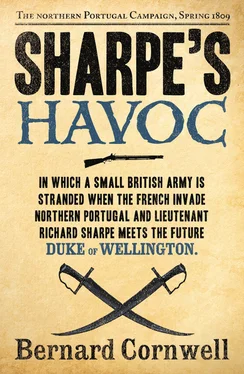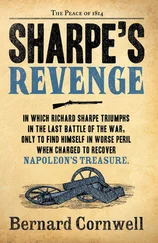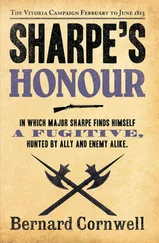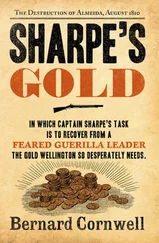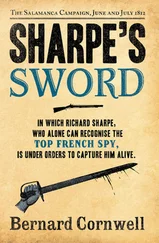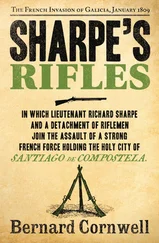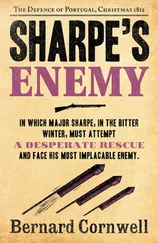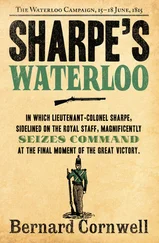Christopher thought about that question. ‘I think,’ he said eventually, ‘that he would prefer not to lose. I think,’ he went on, ‘that if he knows the strength of your sentiments, then he will cooperate.’ Christopher was not nearly as certain as he sounded; indeed he had heard that General Wellesley was a cold man who might not look kindly on an escapade that depended for its success on so many assumptions, but Christopher had other fish to fry in this unholy tangle. He doubted whether the mutiny could ever succeed and did not much care what Cradock or Wellesley thought of it, but knew his knowledge of it could be used to great advantage and, for the moment anyway, it was important that Argenton saw Christopher as an ally. ‘Tell me,’ he said to the Frenchman, ‘exactly what you want of us.’
‘Britain’s influence,’ Argenton said. ‘We want Britain to persuade the Portuguese leaders to accept Soult as their king.’
‘I thought you’d found plenty of support already,’ Christopher said.
‘I’ve found support,’ Argenton confirmed, ‘but most won’t declare themselves for fear of the mob’s vengeance. But if Britain encourages them they’ll find their courage. They don’t even have to make their support public, merely write letters to Soult. And then there are the intellectuals’ – Argenton’s sneer as he said the last word would have soured milk – ‘most of whom will back anyone other than their own government, but again they need encouragement before they’ll find the bravery to express support for Marshal Soult.’
‘I’m sure we would be happy to provide encouragement,’ Christopher said. He was not sure at all.
‘And we need an assurance,’ Argenton said firmly, ‘that if we lead a rebellion the British will not take advantage of the situation by attacking us. I shall want your General’s word on that.’
Christopher nodded. ‘And I think he will give it,’ he said, ‘but before he commits himself to any such promise he will want to judge for himself the likelihood of your success and that, my friend, means he will want to hear from you directly.’ Christopher unstoppered a decanter of wine, then paused before pouring. ‘And I think you need to hear his personal assurances. I think you must travel south to see him.’
Argenton looked rather surprised by this suggestion, but he thought about it for a moment and then nodded. ‘You can give me a pass that will see me safe through the British lines?’
‘I will do better, my friend. I shall come with you so long as you provide me with a pass for the French lines.’
‘Then we shall go!’ Argenton said happily. ‘My Colonel will give me permission, once he understands what we are doing. But when? Soon, I think, don’t you? Tomorrow?’
‘The day after tomorrow,’ Christopher said firmly. ‘I have an engagement tomorrow that I cannot avoid, but if you join me in Vila Real de Zedes tomorrow afternoon then we can travel the next day. Will that suit?’
Argenton nodded. ‘You must tell me how to reach Vila Real de Zedes.’
‘I shall give you directions,’ Christopher said, then raised his glass, ‘and I shall drink to the success of our endeavours.’
‘Amen to that,’ Argenton said, and raised his glass to the toast.
And Colonel Christopher smiled, because he was rewriting the rules.

Sharpe ran across the paddock where the dead horses lay with flies crawling in their nostrils and across their eyeballs. He tripped on a metal picketing pin and, as he stumbled forward, a carbine bullet fluttered past him, the sound suggesting it was almost spent, but even a spent bullet in the wrong place could kill a man. His riflemen were shooting from the field’s far side, the smoke of their Baker rifles thickening along the wall. Sharpe dropped beside Hagman. ‘What’s happening, Dan?’
‘Dragoons are back, sir,’ Hagman said laconically, ‘and there’s some infantry there too.’
‘You sure?’
‘Shot one blue bastard,’ Hagman said, ‘and two greens so far.’
Sharpe wiped sweat from his face, then crawled a few paces along the wall to a place where the powder smoke was not so thick. The dragoons had dismounted and were shooting from the edge of a wood some hundred paces away. Too long a range for their carbines, Sharpe thought, but then he saw some blue uniforms where the road ran through the trees and he reckoned the infantry was forming for an attack. There was an odd clicking noise coming from somewhere nearby and he could not place it, but it seemed to offer no threat so he ignored it. ‘Pendleton!’
‘Sir?’
‘Find Lieutenant Vicente. He’s in the village. Tell him to get his men out on the northern path now.’ Sharpe pointed to the track through the vineyards, the same track by which they had entered Barca d’Avintas and where the dead dragoons of the first fight still lay. ‘And, Pendleton, tell him to hurry. But be polite, though.’
Pendleton, a pickpocket and purse snatcher from Bristol, was the youngest of Sharpe’s men and now looked puzzled. ‘Polite, sir?’
‘Call him sir, damn you, and salute him, but hurry!’
Goddamn it, Sharpe thought, but there would be no escape across the Douro today, no slow shuttling back and forth with the small boat, and no marching back to Captain Hogan and the army. Instead they would have to get the hell out northwards and get out fast. ‘Sergeant!’ He looked left and right for Patrick Harper through the misty patches of rifle smoke along the wall. ‘Harper!’
‘I’m with you, sir.’ Harper came running from behind. ‘I was dealing with those two Frogs in the church.’
‘The moment the Portuguese are into the vineyard we get out of here. Are any of our men left in the village?’
‘Harris is there, sir, and Pendleton, of course.’
‘Send someone to make sure the two of them get out.’ Sharpe levelled his rifle across the wall and sent a bullet spinning towards the infantry who were forming up on the road among the trees. ‘And, Pat, what did you do with those two Frogs?’
‘They’d robbed the poor box,’ Harper said, ‘so I sent them to hell.’ He patted his sheathed sword bayonet.
Sharpe grinned. ‘And if you get the chance, Pat, do the same to that bastard French officer.’
‘Pleasure, sir,’ Harper said, then ran back across the paddock. Sharpe reloaded. The French, he thought, were being too cautious. They should have attacked already, but they must have believed there was a larger force in Barca d’Avintas than two stranded half companies, and the rifle fire must have been disconcerting to the dragoons who were not used to such accuracy. There were bodies lying on the grass at the edge of the wood, evidence that the dismounted French horsemen had been taught about the Baker rifle the hard way. The French did not use rifles, reckoning that the spiralling grooves and lands that spun the bullet in the barrel and so gave the weapon its accuracy also made it much too slow to reload, and so the French, like most British battalions, relied on the quicker-firing, but much less accurate musket. A man could stand fifty yards from a musket and stand a good chance of living, but standing a hundred paces in front of a Baker in the hands of a good man was a death warrant, and so the dragoons had pulled back into the trees.
There was infantry in the wood as well, but what were the bastards doing? Sharpe propped his loaded rifle against the wall and took out his telescope, the fine instrument made by Matthew Berge of London which had been a gift from Sir Arthur Wellesley after Sharpe had saved the General’s life at Assaye. He rested the telescope on the wall’s mossy coping and stared at the leading company of French infantry which was well back in the trees, but Sharpe could see they were formed in three ranks. He was looking for some sign that they were ready to advance, but the men were slouching, musket butts grounded, without even fixed bayonets. He whipped the glass right, suddenly fearing that perhaps the French would try to cut off his retreat by infiltrating the vineyard, but he saw nothing to worry him. He looked back at the trees and saw a flash of light, a distinct white circle, and realized there was an officer kneeling in the leafy shadows staring at the village through a telescope. The man was undoubtedly trying to work out how many enemy were in Barca d’Avintas and how to attack them. Sharpe put his own telescope away, picked up the rifle and levelled it on the wall. Careful now, he thought, careful. Kill that one officer and any French attack is slowed, because that officer is the man who makes the decisions, and Sharpe pulled back the flint, lowered his head so that his right eye was gazing down the sights, found the patch of dark shadow that was the Frenchman’s blue coat and then raised the rifle’s foresight, a blade of metal, so that the barrel hid the target and so allowed the bullet to drop. There was little wind, not enough to drift the bullet left or right. A splintering of noise sounded from the other rifles and a drop of sweat trickled past Sharpe’s left eye as he pulled the trigger and the rifle hammered back into his shoulder and the puff of bitter smoke from the pan made his right eye smart and the specks of burning powder stung his cheek as the cloud of barrel smoke billowed in front of the wall to hide the target. Sharpe twisted to see Lieutenant Vicente’s troops streaming into the vineyard accompanied by thirty or forty civilians. Harper was coming back across the paddock. The odd clicking noise was louder suddenly and Sharpe registered that it was the sound of French carbine bullets striking the other side of the stone wall. ‘We’re all clear of the village, sir,’ Harper said.
Читать дальше
